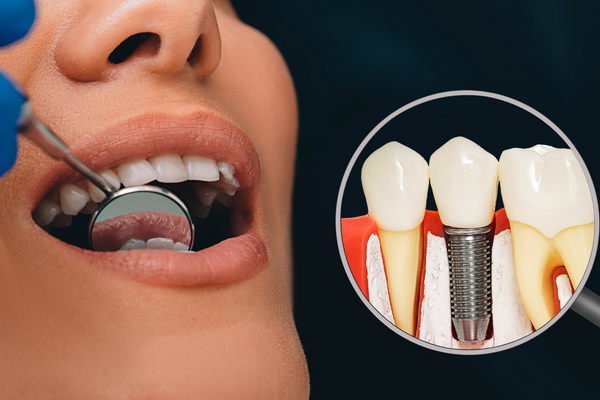Want Us To Contact You?
Implant Dentistry
Finding a replacement for an extracted tooth is quite an essential and necessary step patients must take. Failing to get a missing tooth restored can lead to several drawbacks that are both aesthetic and functional. To help you with this, we recommend dental implants – the best tooth restorations that offer unmatchable properties.
What Are Dental Implants?
Dental implants are the strongest and most highly-preferred tooth restorations. They offer an excellent level of stability and strength, owing to the titanium roots that firmly hold them in the jawbone. The visible tooth will be replaced using a ceramic crown attached to the metal implant. Together, they form a stable and strong restoration that would last for several years together.
Advantages of Choosing Dental Implants
- Implants are highly strong and stable restorations.
- They are long-lasting. In many instances, they are down to have lasted for over 15 years without hassle.
- Implants are life-like in both appearance and functionality. They can be customized to look just like a real tooth. Also, the functionalities of a natural tooth, such as biting and chewing, will be restored.
- If you lose a frontal tooth, your phonetics will change. This can be reversed with the help of an implant as it fills in the gap completely.
- The durability of the ceramic crown is excellent. It would hardly wear with regular oral functions such as biting and chewing food.

Implant Placement Procedure
The procedure for placing the implant would usually take place over two different consultations. During the first sitting, the dentist will screen your oral cavity and run a few tests to determine the candidacy for implants. A CBCT scan will be conducted to understand the exact positioning of the teeth and determine the jawbone volume. This ensures the longevity and stability of the implant. Once you qualify, we would go ahead with planning the treatment procedure.
During the implant placement surgery, a titanium stud will be implanted into the jawbone. For this, we will administer local anesthesia to numb the gums, teeth, and jawbone. A small hole will be made in the jawbone, and the implant will be inserted in it with high accuracy. You will be advised a healing period of a few weeks to allow the bone to fuse with the implant.
During the next surgery, we will carefully place an abutment on the implant. This connecting element helps to hold the crown stable. The crown will be placed on the abutment and bonded firmly using dental adhesives. A bite test is conducted to ensure the crown doesn’t alter your natural bite.
Post Implantation Care
Although the implant offers excellent strength and durability, it is advisable not to bite or chew hard foods. Activities like opening bottle caps or ripping open plastic bags with teeth should be avoided. In addition, it is crucial you maintain optimum oral hygiene by brushing and flossing twice every day to keep the gums free from infections and the teeth from cavities. If you feel the implant has loosened, please visit the dentist immediately to get it treated and restored.


